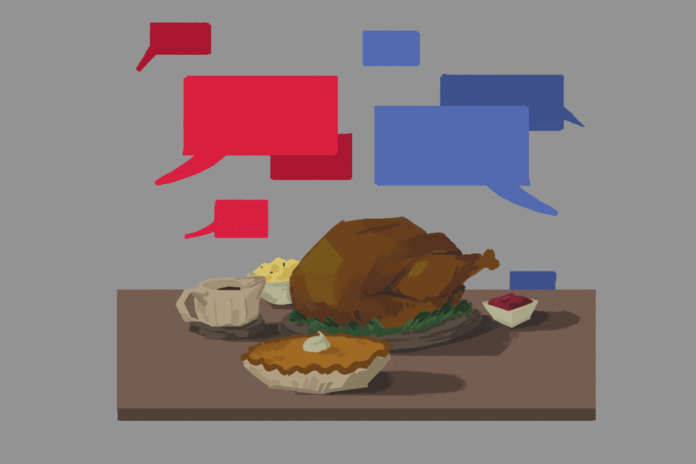UC Davis students share their experiences and advice on controversial discussions with family during the holiday season
By GRACIELA TIU — features@theaggie.org
Although the holiday season can bring people feelings of love and comfort, spending time with family during these festivities often also brings up controversial conversations. Conversing with close friends or extended family over the holidays can sometimes turn unpleasant, especially when the topics at hand get too personal or political.
Many people, including students at UC Davis, have experienced these uncomfortable or disagreeable family discussions and try their best to circumvent them.
“I would try to avoid bringing up anything to do with politics,” Serineh Ohanian, a third-year managerial economics major, said. “Since they grew up in a different environment, they have different ideas and perspectives on certain topics and what the government should do about them. Because I was brought up in the more modern age that is more inclusive, I would say I do have a different perspective than they do.”
Sometimes, deciding whether to bypass or continue these conversations depends on which family members are present.
“If it is with a close family member that I know I can find common ground with, we might further engage in an uncomfortable conversation,” Eliana Shor, a second-year managerial economics major, said. “If it is with a family member I am not as close with, I tend to walk away.”
Nicole Hazen, a first-year chemistry major, described her method of navigating these exchanges.
“With conversations like that, I usually engage and try to resolve conflict, but I also don’t let them get their way,” Hazen said.
Ohanian has also changed how she moves through these conversations, especially because she wants to stay mindful of any children in the family who may be listening.
“I would say that my approach has changed over the years,” Ohanian said. “I would be more quiet, I would sit down, I wouldn’t say a word and I wouldn’t want to cause an argument or a fight. In more recent years, I definitely have spoken up more because I know there are young children here listening, and they are extremely impressionable.”
Ohanian continued to emphasize the impression that arguments can make on younger family members.
“When they hear these things, they just believe the people around them,” Ohanian said. “They’re too young to know how to do research or how to gain their own information or truly what to believe. When you speak up, they hear another argument or another point, and it makes them able to see a different side of things.”
When talking with family, students like Shor find it helpful to speak with intention and awareness of different perspectives.
“Over the years, I’ve begun to give more compassion and respect to people with opposing views on political issues,” Shor said. “I’ve grown to be less argumentative and more careful with what I say and the battles I choose to fight.”
Certain topics might feel unavoidable, but consciously choosing which subjects to continue discussing can also help avert any unnecessary conflict.
“My advice would be to know when to pick your fights,” Ohanian said. “Figure out which topics are really important and speak up about those — but if it’s something minor, you know, it is your family, it is the holidays. Keep the peace and have everything be as calm, civil and loving as possible.”
Convincing your family to agree with your opinions typically tends to be harder than you think.
“Give your family understanding and time, as that is the only way that they will begin to feel comfortable listening,” Shor said. “You can’t change anyone’s mind overnight, and their difference in opinion doesn’t inherently make them a bad person.”
Even though in the moment, persuading family members to agree with you might seem like the best solution, it might not always be possible.
“I would say there typically isn’t a sense of understanding [reached] since you honestly do have your own mindset and ideas, and it’s really hard to switch [theirs] as much as you try,” Ohanian said. “But, I’ll always be there to have open discussions and open communication with them and really be understanding.”
Ultimately, if it is possible and feels right, moving past any arguments and appreciating the time spent with family during the holidays might feel more enjoyable, as these Davis students have attested.
“I always try to end things on a good note and come together,” Hazen said, “Just so we can all stay on good terms and appreciate the moment.”
Written by: Graciela Tiu — features@theaggie.org





